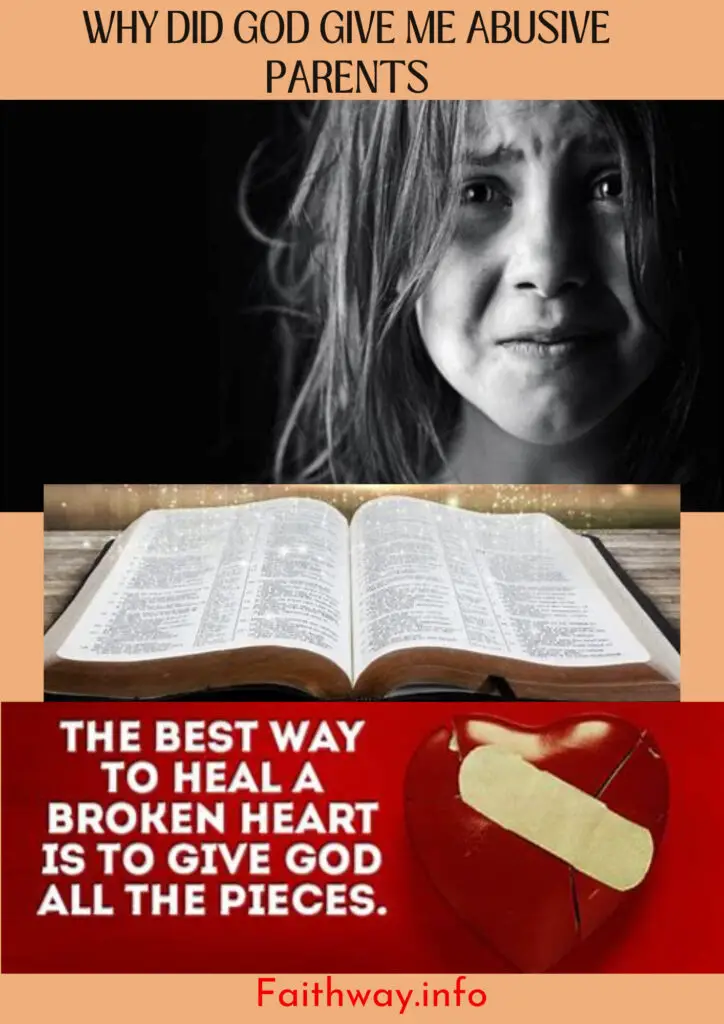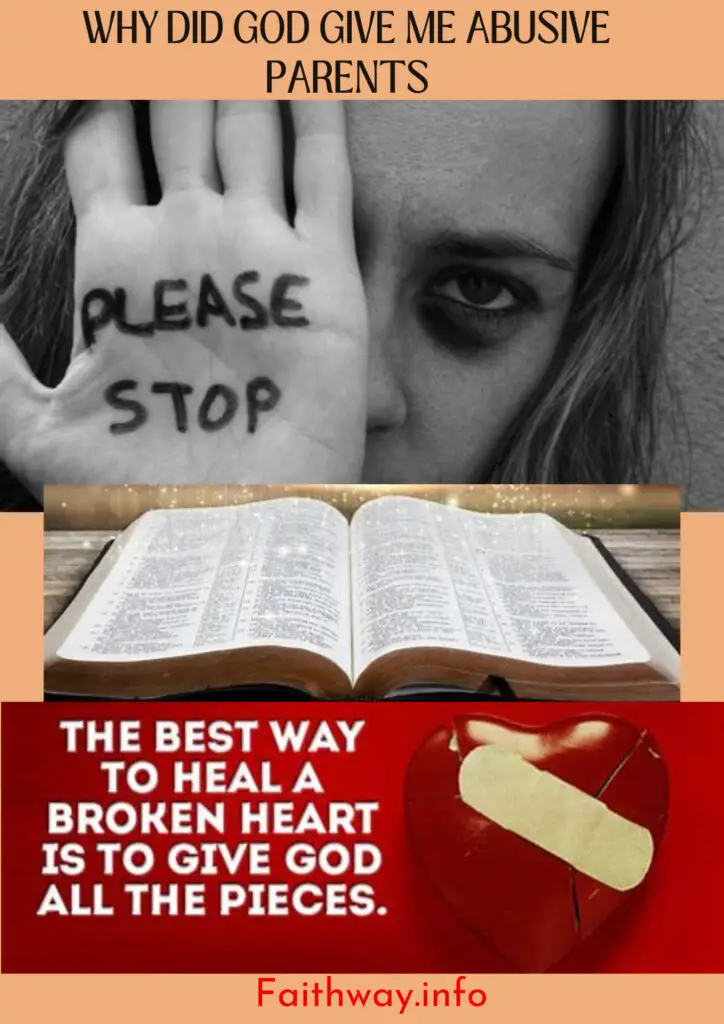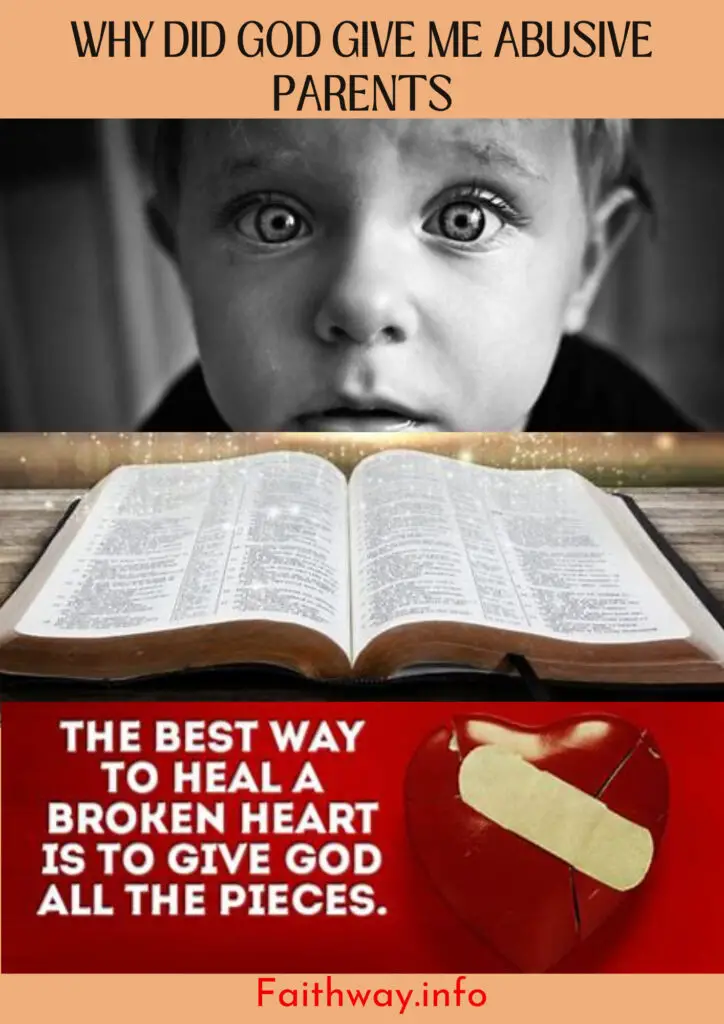Growing up with abusive parents is an excruciating experience, leaving deep scars that can shape one’s entire life.
During these dark times, it’s natural to question why a loving God would allow such pain to exist.
As a child of God, my heart aches for your anguish, and I want to assure you that understanding God’s perspective can bring solace amidst the turmoil.
Together, let us explore the enigmatic ways of God and shed light on why He permits some people to have abusive parents.
Understanding God’s Purpose
Each individual possesses a unique purpose in life, with their experiences intricately woven into God’s master plan.
While abusive parents manifest in various forms, such as physical, emotional, or verbal abuse, it is essential to acknowledge that God does not condone any form of abuse.
However, in granting humanity free will, God permits some individuals to misuse their freedom, resulting in the infliction of pain upon others.
Consequently, certain children are born into families where they face abuse.
It is important to note that God does not desire for anyone to have abusive parents, but rather, He allows it to occur as part of His greater purpose.

Biblical Perspective
The Scriptures teach us that God works all things together for the good of those who love Him and are called according to His purpose (Romans 8:28).
This powerful verse encapsulates the idea that even in the midst of abuse, God can transform the pain into something redemptive and purposeful.
Consider the story of Joseph from the Book of Genesis.
He was sold into slavery by his jealous brothers, endured years of imprisonment, and yet ultimately rose to a position of great authority in Egypt.
Through his journey, Joseph came to understand that God had orchestrated every circumstance for a higher purpose—to save many lives during a time of famine.
Similarly, individuals who have experienced abuse can find solace in knowing that God can utilize their painful experiences for good.

Transforming Pain into Purpose:
As I walk alongside you in this journey of healing, I want to share a profound truth: God can bring beauty from the ashes of abuse.
I want to speak directly to you, addressing the depths of your pain and offering a glimmer of hope.
When I think about the aftermath of abuse, one thing stands out: your incredible ability to empathize and support others who have endured similar hardships.
Your firsthand understanding of the pain you’ve endured and your remarkable resilience in overcoming adversity make you a beacon of hope.
You possess a unique gift to extend compassion, healing, and guidance to those who are in desperate need of understanding and support.
Your own experiences enable you to connect with others on a deep level, offering them solace and walking alongside them as a source of strength.
I want you to know that your journey doesn’t end with surviving abuse; it extends far beyond that.
You have the power to become an agent of change, a catalyst for restoration and transformation in the lives of others.
The pain you’ve endured can be redeemed as you use it to bring healing and hope to those who are still trapped in darkness.
Your voice and your story have the potential to make an indelible impact on the lives of others, guiding them toward their own path of healing and renewal.
Furthermore, the experience of abuse has the power to forge an unbreakable faith within you.
It is through the fires of adversity that gold is refined, and similarly, your character can be strengthened through your journey.
I have witnessed firsthand the incredible capacity of survivors like you to deepen your dependence on God and solidify your spiritual foundation.
The trials and tribulations you have faced may have shaken your faith at times, but they have also tested and strengthened it, allowing it to emerge even more resolute.
In the depths of your pain, it is natural to question why God allowed such suffering to happen.
But I want to encourage you to shift your perspective and recognize that God can use even the most agonizing experiences for His purposes.
He longs to bring healing and restoration into your life, and He can take the broken pieces of your story and create something remarkable out of them.

As you continue on this path of healing, know that you are not alone.
I am here, walking beside you, offering support, encouragement, and understanding. And above all, God is with you every step of the way.
He sees your pain, He hears your cries, and He longs to bring comfort and healing to your wounded heart.
Trust in His unwavering love, lean on His strength, and allow Him to guide you toward a future filled with joy, purpose, and the fullness of His love.
Remember, dear reader, you are not defined by the pain inflicted upon you.
You are a survivor, a testament to the incredible resilience of the human spirit.
Your story is powerful, and it has the potential to inspire and bring hope to countless others who are walking a similar path.
Embrace your journey, embrace your worth, and know that you are deserving of a life filled with love, peace, and wholeness.
Together, let us continue to seek healing, support one another, and trust in God’s unfailing goodness.
Your story is still being written, and with God as your author, it is bound to be a tale of triumph, resilience, and redemption.

The Role of Free Will in Parenting
As previously mentioned, God gave us free will, which means that we are able to make our own choices.
Unfortunately, some people choose to use their free will to hurt others. This includes parents who abuse their children.
While it may be difficult to understand why someone would choose to hurt their own child,
it’s important to remember that God does not condone abuse in any form. It’s also important to remember that abusive behavior is not the fault of the child.
Children are not responsible for the actions of their parents, and they should never feel like they deserved to be abused.
Parents have a responsibility to raise their children in a loving and nurturing environment.
The Bible says in Proverbs 22:6, “Start children off on the way they should go, and even when they are old they will not turn from it.”
Parents who abuse their children are not fulfilling their God-given responsibility to raise their children in a way that honors Him.

Breaking the Cycle of Abuse
Children who have experienced abuse may be at a higher risk of becoming abusers themselves.
However, it’s important to remember that this does not have to be the case. With help and support, it’s possible to break the cycle of abuse.
One way to break the cycle of abuse is to seek professional help. Therapy can be a useful tool in helping individuals process their experiences and learn healthy coping mechanisms.
It’s also important to surround oneself with positive and supportive people. This can include family, friends, and members of a faith community.

Finding Forgiveness and Healing
Forgiveness is an important aspect of healing from the trauma of abuse.
It does not mean that the abusive behavior of your parents is okay and should be excused.
But rather, forgiveness is a way to release anger and bitterness.
I’m not saying that forgiveness is easy. In fact, forgiving your abusive parents is one of the most challenging aspects of healing from abuse.
It is a process that requires courage, vulnerability, and the guidance of the Holy Spirit.
Mind you, forgiveness does not condone or minimize the pain inflicted upon you but rather sets you free from the chains of bitterness and resentment.
As you embark on this road, here are some principles to consider:

1. Recognize the depth of the pain:
Acknowledge the magnitude of the pain caused by abusive parents.
Allow yourself to grieve the loss of a healthy, nurturing relationship and the innocence that was stolen from you.
This acknowledgment does not undermine forgiveness but serves as a starting point for the healing journey.
2. Seek healing and support:
Before forgiveness can truly take root, it is essential to prioritize your own healing and seek support.
Engage in therapy or counseling to address the emotional wounds caused by abuse.
Surround yourself with a supportive community that understands your journey and can provide guidance and encouragement along the way.
Healing is a prerequisite for forgiveness, as it enables you to process your pain and develop the resilience needed to navigate forgiveness with authenticity.
3. Understand the nature of forgiveness:
Forgiveness is a conscious choice, not a one-time event. It is a process that unfolds over time, with its own ebbs and flows.
Understand that forgiveness does not excuse or justify the actions of the abusers. Instead, it is an act of releasing the burden of anger, resentment, and vengeance from your own heart.
It is a personal decision that empowers you to reclaim your own peace and freedom.
4. Embrace empathy and compassion:
As you work toward forgiveness, strive to cultivate empathy and compassion for your abusive parents.
Recognize that their actions were likely influenced by their own brokenness, pain, and distorted understanding of love.
This does not absolve them of responsibility, but it can provide perspective and help humanize them.
Pray for their healing and transformation, but also set healthy boundaries to protect yourself from further harm.
5. Surrender to God’s grace:
Forgiveness is not something we can achieve on our own strength.
It requires surrendering to God’s grace and relying on His power to enable us to forgive.
Seek God’s guidance and ask for His strength to help you forgive.
Allow Him to work in your heart, softening the bitterness and replacing it with His love and compassion.
Remember that forgiveness is a divine act, made possible by the example of Christ’s forgiveness on the cross.
Ultimately, forgiveness is a deeply personal and individual journey. There is no set timeline or formula for forgiveness, and it may look different for each person.
Be patient and gentle with yourself, honoring your own process.
As you navigate the path of forgiveness, trust that God will provide the wisdom, strength, and grace you need to move forward.

Growing Stronger Through Adversity
Going through difficult experiences can be incredibly challenging, but it can also be an opportunity for growth in your life.
The Bible says in 1 Peter 5:10, “And the God of all grace, who called you to his eternal glory in Christ, after you have suffered a little while, will himself restore you and make you strong, firm and steadfast.”
It’s important to remember that God can use your pain to help you grow and become stronger.
Difficult experiences can teach us important lessons and help us become more resilient. They can also help us learn empathy and compassion for others who are going through similar struggles.

Lessons Learned from Difficult Experiences
Difficult experiences can teach us important lessons that can help us throughout our lives.
For example, someone who has experienced abuse may have learned the importance of setting boundaries and standing up for oneself.
They may have also learned the importance of seeking help and support when needed.
It’s important to reflect on the lessons learned from difficult experiences and use them to grow and become a better person.
The Bible says in Romans 8:28, “And we know that in all things God works for the good of those who love him, who have been called according to his purpose.”
While it may be difficult for you to see the good in difficult experiences, it’s important to remember that God can use them for good in your life.

Trusting in God’s Love and Guidance
Trusting in God’s love and guidance can be a powerful tool in healing from the trauma of abuse.
The Bible says in Psalm 34:18, “The Lord is close to the brokenhearted and saves those who are crushed in spirit.”
It’s important to remember that God is always with you, even in the darkest of times.
Prayer can be a powerful tool in connecting with God and seeking guidance and comfort. It’s important that remember that prayer does not always have to be formal or scripted.
It can be as simple as talking to God in your own words and expressing your thoughts and emotions to Him.

The Power of Prayer in Difficult Times
Prayer is a powerful tool in finding comfort and strength during difficult times.
The Bible says in Philippians 4:6-7, “Do not be anxious about anything, but in every situation, by prayer and petition, with thanksgiving, present your requests to God. And the peace of God, which transcends all understanding, will guard your hearts and your minds in Christ Jesus.”
Prayer will help you to release your worries and anxieties to God and find peace in His love and guidance.
It will also help you to find the strength and courage you need to overcome difficult challenges.
That said, it’s important to remember that prayer is not a magic solution to your problems, but rather a tool to help you find comfort and guidance in God’s love.

Helping Others Through Shared Experiences
Sharing your experiences with others who have gone through similar struggles can be a powerful tool in helping you to find support and heal quickly.
It’s important to remember that abuse can be a very isolating experience and that it can be difficult to share your experiences with others.
However, finding a support group or seeking out counseling can be a helpful way to connect with others who have gone through similar experiences.
Moreover, helping others is also a grat way to find healing and purpose in your own experiences.
Sharing your experiences with others will also help you and the other persons feel less alone and provide them with hope and encouragement.

Finding Strength in God’s Promises
In times of profound distress, it is crucial to anchor yourself in the promises of God.
His Word serves as a constant source of comfort, guidance, and assurance, reminding us that we are never alone.
Be of good cheer, God is with you and as such, let’s explore a few promises in scripture that can provide solace and strength as you navigate the aftermath of abusive parents.
Isaiah 41:10:
“So do not fear, for I am with you; do not be dismayed, for I am your God. I will strengthen you and help you; I will uphold you with my righteous right hand.”
Here we read about a powerful verse that reminds you that God is present in your pain and fear.
He has promised to strengthen and support you, holding you up with His righteous hand.
Even in the darkest moments, you can find comfort knowing that God is with you, ready to lend His strength to carry you through.
Psalm 34:18:
“The Lord is close to the brokenhearted and saves those who are crushed in spirit.”
This verse speaks directly to the depths of your pain. God is not distant or indifferent; He draws near to the brokenhearted.
In your moments of despair, He is there to bring comfort, healing, and deliverance. He sees your anguish and offers a saving hand to lift you up.
Psalm 147:3:
“He heals the brokenhearted and binds up their wounds.”
The healing power of God knows no bounds. He is the Divine Physician who specializes in healing the brokenhearted.
Just as a skilled surgeon tends to physical wounds, God tends to the wounds of our souls.
He brings restoration, peace, and wholeness, slowly mending the broken pieces and creating something beautiful from the shattered remnants.
2 Corinthians 1:3-4:
“Praise be to the God and Father of our Lord Jesus Christ, the Father of compassion and the God of all comfort, who comforts us in all our troubles, so that we can comfort those in any trouble with the comfort we ourselves receive from God.”
As you receive comfort and healing from God, remember that He equips you to be a source of comfort for others.
Your own experiences of pain and restoration can become a testimony of God’s faithfulness and a source of hope for those who are still suffering.
Through your journey, you can extend compassion and understanding to others, walking alongside them as a tangible reflection of God’s love.
Psalm 27:10:
“Though my father and mother forsake me, the Lord will receive me.”
Here we see a verse that speaks directly to the pain of abusive parents.
Even if your earthly parents have failed you, God is there to receive you with open arms.
His love is unwavering, never conditional on the actions of others.
In Him, you find acceptance, love, and belonging.
He becomes the loving parent you may have longed for, providing the security and nurturing you deserve.

A Brighter Future Ahead: Hope for a Better Tomorrow
I need you to remember that despite the pain and trauma of abuse, there is always hope for a brighter future.
The Bible says in Jeremiah 29:11, “For I know the plans I have for you,” declares the Lord, “plans to prosper you and not to harm you, plans to give you hope and a future.”
Hold on to this hope and remember that God has a plan for your life, even in the midst of difficult experiences.
With help and support, it’s possible to heal from the trauma of abuse and find a sense of purpose and meaning in life.

Final Thoughts
In conclusion, experiencing abuse at the hands of one’s parents can be an incredibly challenging and traumatic experience.
However, it’s important to remember that God is always with us and that He can use our pain and trauma to help us grow and become stronger.
It’s important to seek help and support in healing from the trauma of abuse and to remember that there is always hope for a brighter future.
Through prayer, reflection, and helping others, it’s possible to find healing, forgiveness, and a sense of purpose in one’s experiences.

Faithway.info, your online sanctuary for deepening your spiritual journey and mastering the teachings of the Bible. At Faithway.info, we are passionate about making the wisdom of the Bible accessible to everyone, fostering a community dedicated to growth, understanding, and support.
